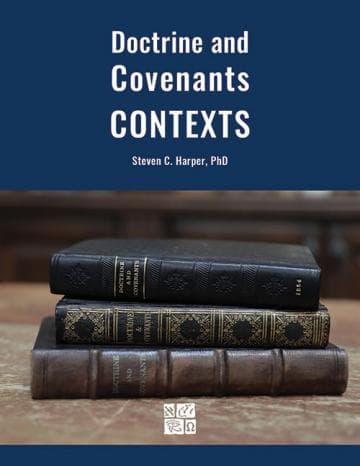Book
136 Chapters

Four newly ordained high priests were among the Church leaders who gathered for conference in Hiram, Ohio, in November 1831. They “requested of the Lord to know his will concerning them.” The Lord obliged them with the first twelve verses of section 68. He then added an amendment to previous revelations about the office of bishop. Then he commented on the implications of the bad parenting he saw in the church.[1]
The Saints resolved to act on this revelation’s instructions regarding bishops and Church discipline.[2] Oliver Cowdery took this revelation and others to the Saints in Missouri. The brethren who sought the Lord’s will and received it acted on it pretty well in the short term. Orson Hyde, William McLellin, and the Johnson brothers would all be chosen as apostles in 1835, largely because of their faithfulness to the Lord’s commission in this revelation to preach the gospel by his Holy Spirit. All of them struggled to endure in that commission and were at one time or another antagonistic to the Church.
Section 68 gives a unique definition of scripture as the voice of God communicated by his Holy Spirit to his authorized servants in real time. In dictionaries of Joseph’s day, the word scripture literally meant “what is written.” Then and now the word connoted very old sacred writing. The sooner we get past that confining idea the better. In 1838 Ralph Waldo Emerson urged Harvard graduates “to show us that God is, not was; that He speaketh, not spake.”[3] Joseph Smith already had.
The Lord uses this revelation and others to gives instruction on parenting. Children come weak and helpless. Powerless to act for themselves but innately divine, children can be empowered to act for themselves if properly parented. Out of love, God empowers his children to act as he acts. God empowers his children by teaching them law, beginning with the law of the gospel. If children are not taught God’s laws as they mature, they will never have agency or power to act for themselves. Teaching children the law of the gospel is a prerequisite to their gaining the ability to choose and act for themselves.
Teaching children the laws of God does not guarantee they will keep them. It does guarantee that they will be able to choose for themselves whether to keep them. Parents who do not teach and therefore do not endow the children with agency will answer to God for deciding for the children rather than empowering them to choose for themselves. This revelation, together with sections 29 and 121, shows how the Lord both teaches and models how to endow children with power by giving them laws and, thus, agency.
[1] “History, 1838–1856, volume A-1 [23 December 1805–30 August 1834],” p. 163, The Joseph Smith Papers, accessed June 5, 2020. “Revelation, 1 November 1831–A [D&C 68],” p. 113, The Joseph Smith Papers, accessed June 5, 2020.
[2] “Resolved: that the mode and manner of regulating the Church of Christ, take effect from this time, according to a revelation received in Hiram, Portage County, Ohio, Nov. 11, 1831.” Far West Record, July 3, 1832, p. 34.
[3] Ralph Waldo Emerson, “An Address,” July 15, 1838, Harvard Divinity School, in Brooks Atkinson, editor, The Complete Essays and Other Writings of Ralph Waldo Emerson (New York: Modern Library, 1950), 80.
Book
136 Chapters
Items in the BMC Archive are made publicly available for non-commercial, private use. Inclusion within the BMC Archive does not imply endorsement. Items do not represent the official views of The Church of Jesus Christ of Latter-day Saints or of Book of Mormon Central.